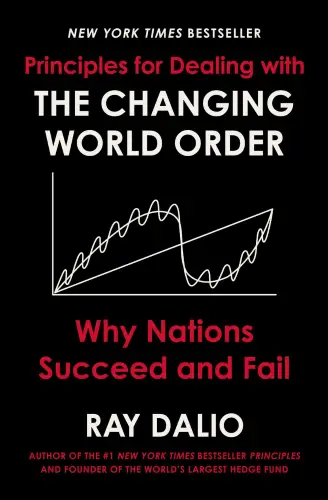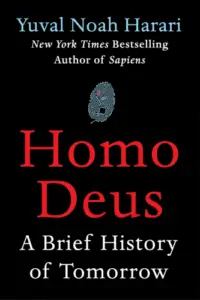Changing World Order: Why Nations Succeed and Fail
Book Author: Ray Dalio
Summary reviewed by:
Terrence Timmons
Terrence Timmons
Analyst
Bachelor of Arts (BA), University Of California, Santa Barbara 2019
With over 4 years of experience as an analyst. Terrence Timmons is committed to analyzing summaries without compromising on quality.
Changing World Order: Why Nations Succeed and Fail: Summary
1) Book Summary
The world is on the brink of massive change, and Ray Dalio’s “Changing World Order: Why Nations Succeed and Fail” reveals the mechanisms behind this transformation, providing a roadmap to understand and navigate the turbulent times ahead. Dalio’s main thesis is that history repeats itself in cycles, and by understanding these cycles, we can predict the rise and fall of nations, economies, and global orders. He meticulously analyzes historical data from the past 500 years, identifying patterns that have led to the rise and decline of great empires, including the Dutch, British, and American empires.
Dalio argues that the current global order, dominated by the United States, is in decline, making way for a new world order potentially led by China. He outlines key factors contributing to this shift, including debt cycles, wealth gaps, technological advancements, and geopolitical conflicts. He emphasizes that these factors are not isolated but interconnected, influencing each other in complex ways. By examining the past, Dalio offers insights into the future, urging readers to prepare for the coming changes by understanding the forces at play.
2) Historical Context and Analysis
Dalio’s work is rooted in a deep historical analysis that spans centuries, drawing on a vast array of data points to support his claims. He delves into the rise and fall of major empires, highlighting how economic cycles, internal strife, and external threats have repeatedly led to the downfall of once-great nations. He points out that the same patterns observed in the past are evident today, with many of the world’s current challenges—rising debt, increasing inequality, and intensifying geopolitical tensions—mirroring those faced by previous declining empires.
Dalio’s historical perspective is both enlightening and sobering. He illustrates how the decline of dominant powers often leads to periods of chaos before a new order emerges. His analysis is not just a theoretical exercise; it is a practical guide to understanding the present and preparing for the future.
3) Key Themes and Concepts
Central to Dalio’s thesis is the concept of the “Big Cycle,” a recurring pattern that governs the rise and fall of empires and global orders. This cycle is driven by the interplay of several key factors: debt, economic productivity, wealth gaps, and internal and external conflicts. Dalio explains how these factors interact to create periods of prosperity followed by periods of decline and upheaval.
He also introduces the idea of the “Three Big Forces”—namely, debt and money, internal conflict between rich and poor, and the rise of a great power to challenge the existing one. According to Dalio, understanding these forces is crucial to predicting the future and making informed decisions in both personal and professional contexts.
4) Practical Implications for Today’s World
For individuals and leaders, Dalio’s insights offer a guide to navigating the uncertainties of the current global landscape. He suggests that by recognizing the signs of decline in the current world order, we can take steps to protect ourselves and our investments. He advises diversification, staying informed, and being adaptable to change as essential strategies in an era of increasing volatility.
For policymakers, Dalio’s analysis provides a framework for understanding the broader forces at play and making decisions that could mitigate the risks of a declining empire. He warns that without significant reform, the United States and other Western nations may face severe consequences as the global balance of power shifts.
5) Conclusion
“Changing World Order: Why Nations Succeed and Fail” is a thought-provoking and meticulously researched book that offers a comprehensive view of the cycles that shape our world. Ray Dalio combines historical analysis with practical advice, making it an essential read for anyone seeking to understand the forces driving global change and how to navigate them. As the world faces unprecedented challenges, Dalio’s insights provide both a warning and a guide to the future, urging us to learn from the past to prepare for what lies ahead.
Changing World Order: Why Nations Succeed and Fail: Genres
Non-fiction
Economics
History
Geopolitics
Changing World Order: Why Nations Succeed and Fail: Themes
The Big Cycle: Dalio explores the recurring pattern of rise and decline that governs the fate of empires and global orders. This cycle is driven by the interplay of economic, social, and geopolitical factors. For instance, Dalio examines the decline of the British Empire and the current challenges faced by the United States, suggesting that history is repeating itself.
Debt and Money: The book emphasizes the role of debt in shaping economic cycles. Dalio explains how excessive borrowing leads to periods of economic growth followed by downturns when debts become unsustainable. He uses historical examples, such as the Great Depression and the 2008 financial crisis, to illustrate how debt has played a pivotal role in economic collapses.
Wealth Gaps and Internal Conflict: Dalio discusses the widening gap between the rich and the poor as a critical factor that contributes to social unrest and internal conflict within nations. He highlights how this disparity has historically led to revolutions and political upheavals, drawing parallels to current events in various countries.
Geopolitical Shifts: The rise of a new global power often leads to conflict with the established order. Dalio details how the rise of China challenges the current global dominance of the United States, comparing this dynamic to past power shifts between nations such as the transition from British to American dominance.
Adaptability and Resilience: Dalio stresses the importance of adaptability in the face of changing global conditions. He argues that nations, companies, and individuals who can recognize and respond to these changes are more likely to succeed. Dalio cites examples from history where adaptability has determined the success or failure of nations and leaders.
Changing World Order: Why Nations Succeed and Fail: What You Need to Know
(Contains Spoilers: Perfect for readers seeking a quick review.)
In "Changing World Order: Why Nations Succeed and Fail," Ray Dalio presents a comprehensive analysis of the factors that lead to the rise and fall of nations, rooted in historical patterns he refers to as the "Big Cycle." He argues that the current world order, dominated by the United States, is in a period of decline, with China poised to become the next global superpower.
The book is structured around the idea that history operates in predictable cycles, driven by a combination of economic, social, and geopolitical forces. Dalio begins by examining the concept of the Big Cycle, illustrating how empires such as the Dutch, British, and American rose to prominence and then fell into decline. He identifies key factors that contribute to these cycles, including debt accumulation, wealth inequality, technological innovation, and military conflict.
Dalio explains that the accumulation of debt is a critical factor in the rise and fall of nations. When a country takes on too much debt, it fuels economic growth in the short term but eventually leads to economic downturns and crises when the debt becomes unsustainable. He cites historical examples such as the Great Depression and the 2008 financial crisis to demonstrate how debt has triggered economic collapses.
Another significant factor in Dalio’s analysis is the widening gap between the rich and the poor. He argues that when wealth inequality reaches extreme levels, it leads to social unrest, political instability, and ultimately, the decline of nations. Dalio points to historical events like the French Revolution and the more recent rise of populist movements around the world as evidence of this phenomenon.
Dalio also discusses the role of technological advancements in shaping the fortunes of nations. He argues that nations that lead in technological innovation tend to rise to global prominence, while those that fall behind in technology often decline. The book examines how technological leadership played a role in the rise of the British Empire during the Industrial Revolution and the current technological competition between the United States and China.
Geopolitical shifts are another critical theme in the book. Dalio explains that the rise of a new global power often leads to conflict with the established order. He details how China’s rise is challenging the current global dominance of the United States, drawing parallels to past power shifts such as the transition from British to American dominance in the early 20th century.
Dalio concludes with a discussion on the importance of adaptability and resilience in the face of these global changes. He argues that nations, companies, and individuals who can recognize and respond to these changes are more likely to succeed in the new world order. He advises readers to stay informed, diversify their investments, and be prepared for a future marked by significant economic and geopolitical shifts.
Changing World Order: Why Nations Succeed and Fail: Methodology
Our approach combines Expert Analysis, Synthesizing Content, and a commitment to Quality and Integrity. We begin by meticulously analyzing Ray Dalio's insights, identifying the crucial themes like the "Big Cycle" and the impact of debt on nations' rise and fall. From this analysis, we distill the essence into a clear, concise summary, ensuring that every word reflects Dalio’s core messages accurately. Each summary undergoes a thorough review to guarantee that it remains both trustworthy and valuable, providing readers with a reliable resource to understand and apply the book's insights.


Changing World Order: Why Nations Succeed and Fail
Date Published: November 30, 2021
Disclaimer: As an Amazon Associate I earn from qualifying purchases.




